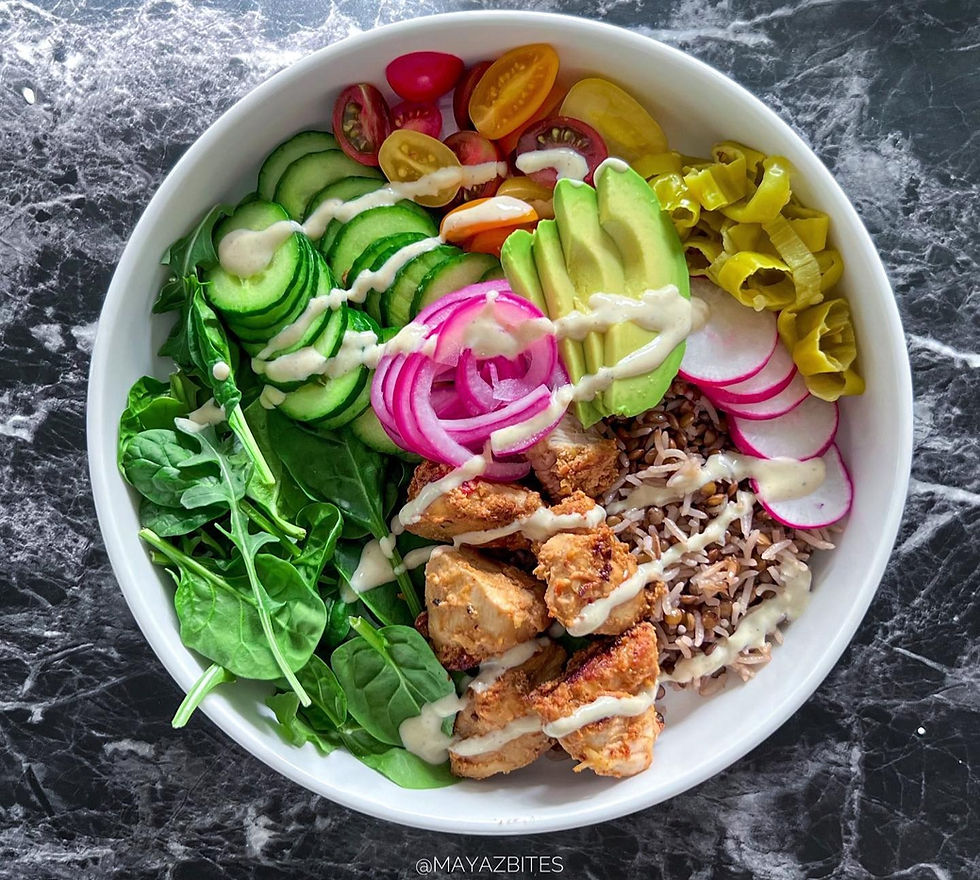The Ultimate Mediterranean Diet Protein Guide: Everything You Need to Know from a Registered Dietitian
- Maya Oueichek, MBA, RDN
- Feb 6, 2024
- 3 min read
Mediterranean Diet Protein Guide By Registered Dietitian Maya Oueichek, MBA, RDN

Incorporating a variety of protein sources ensures a well-rounded and delicious Mediterranean diet lifestyle. I always recommend building your meal around your protein source to make it easier to achieve a balanced meal.
Why Does the Mediterranean Diet Focus on Protein?
Protein supports muscle health, aids in weight management, and helps regulate blood sugar levels.
Including sufficient protein in the diet helps promote a feeling of fullness, which can contribute to weight management by reducing overeating and snacking.
Protein complements the other key components of the Mediterranean Diet, including fruits, vegetables, whole grains, and healthy fats, creating a well-rounded and nutritionally sound eating pattern.
How much protein do you need?
Protein needs should be tailored to meet your own individual requirements based on your lifestyle and current body needs. My general recommendation is to aim for 30g per meal for individuals living an active lifestyle. I understand this might be a challenge for many, so I'm hoping this list can help you visualize your protein intake and adjust accordingly.
What Makes These Protein Sources Unique To The Mediterranean Diet:
Sustainability: Mediterranean protein sources often include sustainable options like fish and legumes, contributing to a diet that is both environmentally and ethically conscious.
Rich Nutrient Profile: The chosen proteins, such as fish, nuts, and seeds, not only provide essential amino acids but also deliver a wealth of additional nutrients like omega-3 fatty acids, antioxidants, and fiber.
Heart-Healthy Fats: The incorporation of oily fish in the Mediterranean diet introduces heart-healthy fats, particularly omega-3s, which are renowned for their positive impact on cardiovascular health.
Culinary Versatility: These protein sources lend themselves to diverse culinary creations, allowing for a wide range of flavorful and satisfying dishes that reflect the region's rich gastronomic heritage.
Plant-Based Emphasis: The Mediterranean diet places a strong emphasis on plant-based proteins such as legumes, showcasing a balanced approach that aligns with both nutritional and environmental well-being.
The Ultimate Mediterranean Diet Protein Guide List:
🦐Part 1: Seafood
🌱Part 2: Plant-based
🍗Part 3: Meat & Poultry
🥛Part 4: Dairy
Seafood:
Incorporating seafood in the Mediterranean diet introduces heart-healthy fats, particularly omega-3s, renowned for their positive impact on cardiovascular and cognitive health.
These sources include:
Fatty Fish:
Salmon
Mackerel
Sardines
Herring
Tuna
White Fish:
Cod
Haddock
Sea Bass
Shellfish:
Shrimp
Mussels
Clams
Octopus
Mollusks:
Squid
Octopus
Anchovies
Here's What 30g servings Looks Like
Plant-based:
Plant-based proteins are vital in the Mediterranean diet, contributing to heart health, essential nutrient intake, and digestive health. Rich in fiber, they promote a robust digestive system. Choosing plant proteins aligns with environmental sustainability, reducing the ecological impact associated with animal agriculture.
Legumes:
Chickpeas
Lentils
Black beans
Cannellini beans
Fava beans
Nuts and Seeds:
Almonds
Walnuts
Chia seeds
Flaxseeds
Pumpkin seeds
Sunflower seeds
Whole Grains:
Quinoa
Farro
Bulgar
Brown rice
Soy
Tofu
Tempeh
Edamame
Vegetables:
Broccoli
Spinach
Brussels sprouts
Peas
Here's What 30g servings Looks Like
Meat & Poultry
Incorporating lean meats like chicken, turkey, and lean cuts of beef provides a high-quality protein source.
Chicken:
Skinless, boneless Breast
Skinless, boneless thighs
Lean ground chicken
Turkey:
Lean ground
Skinless, boneless breast
Skinless, boneless thighs
Beef:
Lean cuts like sirloin or tenderloin
Lean ground
Lamb: Lean cuts of lamb, such as loin or leg
Pork: tenderloin
Game meats: venison
Here's What 30g servings Looks Like
Dairy
Incorporating yogurt, cheese, and milk into your meals not only adds high-quality protein but also provides essential nutrients like calcium and vitamin D. My advice is to combine these ingredients with other protein sources to meet your overall meal needs rather than relying on them solely. The best part? They are not only nutritious but incredibly delicious!
Greek Yogurt
Feta Cheese
Halloumi Cheese
Ricotta Cheese
Kefir
Labneh (strained yogurt)
Manouri Cheese
Graviera Cheese
Cottage Cheese
My Favorite Mediterranean Diet Protein Tips & Tricks
Make protein-rich salads: Create salads with a variety of vegetables, legumes, nuts, seeds, and lean proteins like grilled chicken or fish for a satisfying and protein-packed meal.
Plan balanced meals: Aim to include a source of protein, healthy fats, and fiber in each meal to promote satiety and balance blood sugar levels throughout the day.
Combine protein sources: include both animal and plant-based sources in the same meal to have more variety in your diet vs relying on a single source.
Know the best cooking methods: Since most of these are lean protein sources, it is essential to use the correct cooking techniques to ensure that the flavor isn't compromised.
Have fun with it! Look into experimenting with new recipes and dishes and see if you discover a new favorite protein source


















































Comments